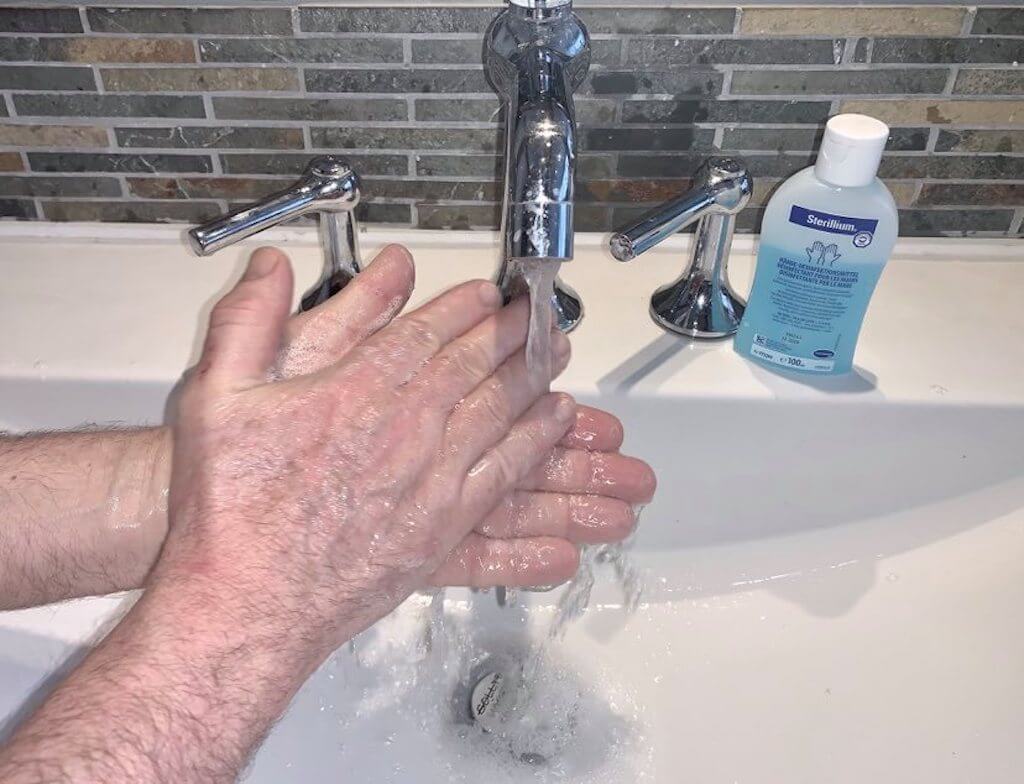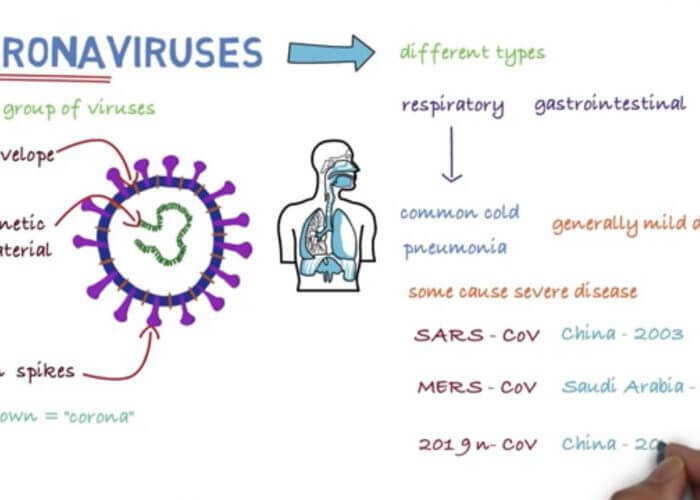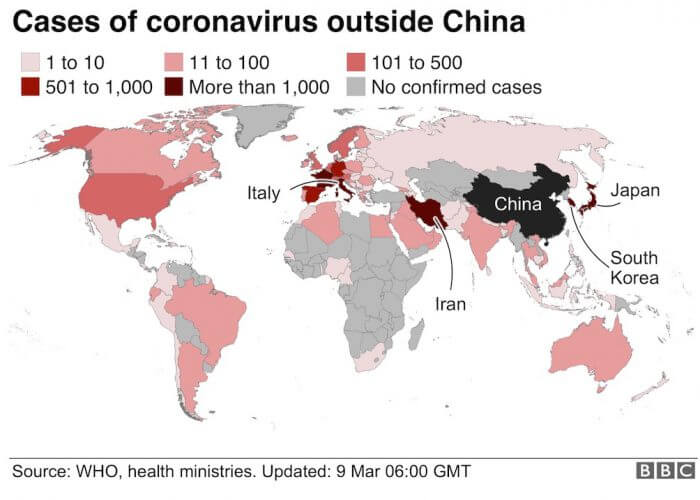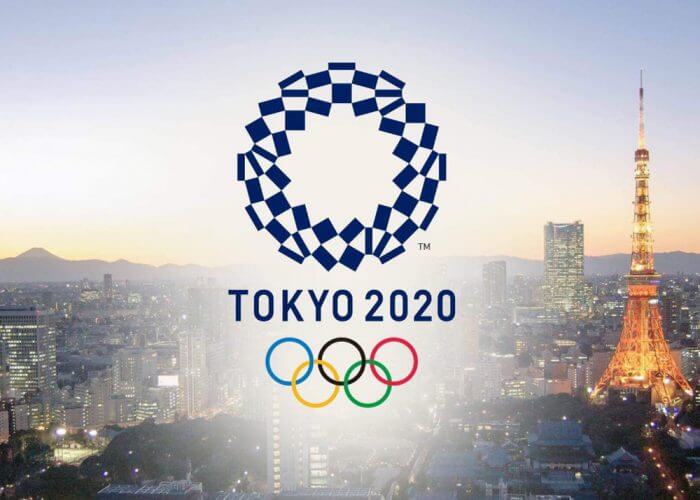Precaution & Perspective Not Panic Over Coronavirus But Let’s Not Wash Our Hands Of Athlete Safety & Human Interest

Editorial content for the 2021 Tokyo Olympic Games coverage is sponsored by GMX7.
See full event coverage. Follow GMX7 on Instagram at @GMX7training #gmx7

Commentary
Italy has taken a cliff-edge decision to avoid the tumble into a crisis it could see coming. Drastic – but deserving of support. When a nation of 60 million people, all of them told to stay at home since last night and until further notice, sees a relative trickle of novel coronavirus cases flood to 9,172 infections and 463 deaths inside a week and knows that there are regions of the country that have just 140 intensive care beds, the response is reasonable for any at a time of containment and control, a time shy of effective and clinically trialled vaccine, a time when scientists work against the clock to understand the nature of the threat and how to deal with it.
Yes, the Italian Olympic Trials have been called off, yes, there’s the economy, yes, there’s the stuff of life, yes, there’s sport – but it can all wait, too, if needs be. Nothing can bring back the 4,000-plus lives lost so far nor those that will be lost this day and the many more predicted for the days and weeks and months ahead. But we can all make every effort and support every effort to limit the damage done, being done and yet to come.
You don’t have to go far on the WWW to find scoffing and use of the much-misused word ‘panic’. Some of that is entirely reasonable in itself: if you’re rushing out to clear 100 tins of soup and veg, 10 tons of rice and 50 packs of toilet paper off the shelves of a local supermarket, panic is your ruler.
Taking precautions and imposing containment measures – including cancelling sports events and rescheduling – not cancelling – Olympic dreams, is not the stuff of panic. Rather, such measures reflect the human capacity for self-preservation, caution, due care, empathy and engaging the biggest muscle any of us are graced with: the brain.
Here’s a case in point, a universal one pertinent to human behaviour not nationality.
In the United States, the City of Santa Clara – a name synonymous with swimming and champion swimmers – announced that it was “taking action to reduce potential exposure to this virus, especially for those individuals who are at higher risk of severe illness.”

The ‘novel coronavirus 2019- CoV’ explained by the World Health Organisation – Photo Courtesy: WHO, YouTube
There were 24 cases in Santa Clara at the time of the announcement five days ago, more than 30 now. The restrictions include postponement of several events, including the local Junior Olympics event scheduled for the coming weekend. Evaluation, said city authorities, would take place on a weekly basis.
Despite that City policy, the organisers of the local ‘Junior Olympics’ had said that the show would go on, with one proviso: we allow this but take no responsibility. In an email to clubs planning to attend the event, organisers note that ” … the swim meet will go forward as planned, but parents are responsible for deciding where their children should attend the meet”.
Say again? So, you, the folk responsible for organising a mass-participation event say ‘roll up, roll up, step right in, take the plunge…’. And if the coronabomb were to hit the fan? What then would they say? Doubtless “we told you it was entirely up to you, the parents…”
That ‘sport-a-realm-apart/accountability-a-dirty-word’-style attitude at governance level needs taking out with a vaccine of its very own on the way to making a roaring chapter for Prof. Margaret Heffernan should she ever wish to revisit and update her insightful book “Willful Blindness – Why We Ignore the Obvious at Our Peril Paperback.” The Santa Clara situation would just be one small line in that chapter in a sport in which raising eyebrows has all too often become as much a habit as an average drill in practice.
‘Safety And Well-Being Of Athletes First’
Little wonder we find Dia C. Rianda, head coach and CEO of Monterey County Aquatic Team and safe-sport advocate, questioning the integrity of organisers for failing to put “the safety and well-being of athletes first”.
The first coach to ask ‘what’s the relationship between the coronavirus and water’ when the World Health Organization-declared global health emergency was building up a little steam, Coach Rianda looks at the Santa Clara situation and says:
“It a Junior Olympics. A blip in the life of a swimmer. Cancelling a JO meet is not the end of the world for an age group swimmer. There are plenty of opportunities ahead for any swimmer . There is no logistical way of social separation at an Age Group Meet . Individuals from countries all over come to attend the meet and can go home spreading the virus.”
Santa Clara county health department has added to city policy with a warning that it will press charges and hold groups, organizations and individuals responsible for not complying with the postponement orders. In other words, those sending out message of ‘show goes on’ for that swim meet with a rider placing responsibility on parents may well be building a loophole through which to escape the risk of being held legally responsible.
Coach Rianda opines that the “conflicting messages and placing liability on club coaches and parents” show how organisers “do not understand that this issue is not about liability. It is about stopping the community spread of a very serious virus.”
With a nod to what it would mean to hold a meet of more than a thousand swimmers in a confined environment at a time when authorities have said ‘stop, don’t do that’, Coach Rianda says:
“There is not enough Purell ( hand sanitizer) in the world to prevent or mitigate the spread of the virus at this meet. Imagine a steam filled locker room (tight quarters) with dozens to hundreds of kids in it. Imagine well over a thousand parent family spectators in the stands. Imagine 3 timers behind the blocks next to each other with no personal separation with dozens of kids back there too in the cold waiting for their heat. Imagine coaches seated along the pool deck literally on top of one another for three 10+ hour days. What could go wrong?”

World Health Organisation statistics presented on a BBC map, March 9, 2020 – Photo Courtesy: BBC
Good question. She’s right, too, when she notes: “I am not panicking. I am not stocking up on Purell, toilet paper or Clorox products. I am just being reasonable.”
Quite so.
Reasonable is all that is asked for. Just as doctors, nurses, company executives, schools, government institutions and many individuals the world over are reasonable with us all as they go about their work with patience and professionalism of a kind that does not shrug and say ‘what’s the fuss about’.
Most with a bigger ear for the ‘not serious for most; just like ‘flu’ end of the thought spectrum out there, are likely to be found among people and communities not yet affected, people with no underlying health issues such as asthma (relatively common among swimmers, for example), elderly and vulnerable relatives. People who feel safe and remote from the calamity of events in China and slow to understand how more than 100,000 infections and more than 3,000 deaths in the source country and what happened next in places such as Italy could be coming to a community near you any day now; slow to understand why experts are urging extreme caution, why they are saying that they now don;’t think the onset of warmer spring and summer weather will have the same effect as seen with ‘flu, why the WHO is getting ever closer to declaring a pandemic.
When comparisons with ‘flu are made and the winter death toll of thousands cited, what those giant shrugs told tell us is that between 60 and 80% of all those deaths occurred among people who did not get vaccinated for a preventable illness – and death. There is no vaccine, as yet, for coronavirus. Hence the official global emergency.
None of that should cause panic, of course, but precaution and what WHO experts have called “necessary aggressive measures” are the only vaccine we have right now.
On the end of Swimming World‘s article noting the decision FINA is now contemplating, Dr. Alex Brothers, from the world of swimming in Canada, writes this insightful and welcome comment:
“I’m a doctor and an Emergency Doctor. I’ve been at this for more than 20 years seeing sick patients on a daily basis. I have worked in inner city hospitals and in the poorest slums. HIV-AIDS, Hepatitis,TB, SARS, Measles, Shingles, Whooping cough, Diphtheria…there is little I haven’t been exposed to in my profession. And with the notable exception of SARS, very little has left me feeling vulnerable, overwhelmed or downright scared.
“I am not scared of Covid-19. I am concerned about the implications of a novel infectious agent that has spread the world over and continues to find new footholds in different soil. I am rightly concerned for the welfare of those who are elderly, in frail health or disenfranchised who stand to suffer mostly, and disproportionately, at the hands of this new scourge. But I am not scared of Covid-19.
“What I am scared about is the loss of reason and wave of fear that has induced the masses of society into a spellbinding spiral of panic, stockpiling obscene quantities of anything that could fill a bomb shelter adequately in a post-apocalyptic world. I am scared of the N95 masks that are stolen from hospitals and urgent care clinics where they are actually needed for front line healthcare providers and instead are being donned in airports, malls, and coffee lounges, perpetuating even more fear and suspicion of others. I am scared that our hospitals will be overwhelmed with anyone who thinks they ” probably don’t have it but may as well get checked out no matter what because you just never know…” and those with heart failure, emphysema, pneumonia and strokes will pay the price for overfilled ER waiting rooms with only so many doctors and nurses to assess.
“I am scared that travel restrictions will become so far reaching that weddings will be canceled, graduations missed and family reunions will not materialize. And well, even that big party called the Olympic Games…that could be kiboshed too. Can you even imagine?”
Hold that thought. Yes, we can imagine. Yes, painful. Crushing. Game-changing. As would be an Olympics with lanes 3, 7 and 8 missing because three of the best were unable to show up through ill-health or worse. Cancellation of the postponement of the Games is not what anyone likely to be reading this would want. However, gnashing of teeth, whining and wailing will not help find solutions should it come to the crunch.
Right now, as FINA and the International Olympic Committee watch events and FINA forms a task force to monitor impact, and at a time when they know that no athlete in Italy can compete this month or next, know that China has struggled, know that the World-Anti-Doping Agency is monitoring testing procedures thrown off track, know that it may simply be impossible to hold Olympic test events as planned, they must do what has not always been their first and best instinct: athlete safety and welfare first.
Couple that with fairness, as in ‘what would be the point of holding an Olympic Games if – and yes, a big if as things stand – 2, 3, 4 out of 10 of the world’s best across all events in the pool, say, are simply not there or in recovery mode and far from being in the best shape?
The proposal FINA is contemplating came from the Kuwaiti member of the executive. It may turn out to be sensible and worth supporting. Far, too, to note that he has no world-class performance community at home to answer to: no cancelled Olympic test event will bother a single athlete from his country. Good then, that other members have not – as they have on far too many occasions of late when it has come to Husain Al-Musallam, a first vice-president cited in 2016 as a co-conspirator in the Richard Lai fraud case but not yet tested in a court of law – thrown their hands in the air for a yes vote in favour of a three-month moratorium.
 Deeper thought and communication with the IOC and Tokyo hosts is surely required – for they have some stark message to bring to the table that will affect athletes in ways that those traumatised by being forced to its out in the boycotts of 1980 and 1984, for example, recognise only too well, along with the families and psychiatrists.
Deeper thought and communication with the IOC and Tokyo hosts is surely required – for they have some stark message to bring to the table that will affect athletes in ways that those traumatised by being forced to its out in the boycotts of 1980 and 1984, for example, recognise only too well, along with the families and psychiatrists.
When asked about a possible IOC decision on “Games or no Games” in May, Dr. Ali Khan, an epidemiologist and dean of the College of Public Health at the University of Nebraska, told Associated Press:
“Hard to imagine this will be defined by the end of May, but it could be. Regardless, numerous sick athletes could not lead to a very interesting Games. From what we know from numerous other mass-gathering events including sporting events, it is very easy to spread diseases worldwide from such events – from meningitis to Zika. Besides welcoming athletes and spectators with their tiny microbes, there is and may be ongoing disease in Japan.”
Kazuhiro Tateda, an expert on infectious diseases and a member of a Japanese government panel, said the virus may not die out quickly. He told Japanes broadcaster NHK:
“Unlike the flu that disappears with warmer weather, the response to the new coronavirus, I think, will have to continue for half a year or a year.”
Hope is on the horizon, with the first clinical trial of the antiviral medicine remsesivir in Covid-19 patients due to report its findings in April. The drug was originally developed to combat the deadly Ebola virus and is now a frontrunner in the many efforts to find a corona-killer.
Meanwhile, beyond all of that, is this: plan B. What is it? What is the IOC, what is FINA, what are its member nations doing to make sure that, if the Games cannot go ahead in July, provision is made, where and when possible, to hold meaningful meets, keep motivation alive. Where is the much-needed promise that the Games will NOT be cancelled, but postponed. Athletes and those they work with need to know that if July is cancelled, their Olympic careers are not. Where there is a will there is a way. This must not be, as Dick Pound, put it “our war”.
The arts of peace, compromise and problem-solving are called for. Urgently. Plan B should already be on the table, holding hands with a flexible timetable. Could sports be held in different cities, could sports be held in Tokyo in waves not floods and many other questions need pondering along the way to a best outcome for athletes.
Olympic economies can surely stomach all of that – and more.
The IOC has ample financial safeguards against cancellation, which has happened only in wartime, 1916, 1940 and 1944, since the modern Olympics began in 1896. Its latest annual report shows it has almost $2 billion in reserve that, AP noted in one report, “could cover running costs until the 2022 Winter Olympics in Beijing”. Actually, it could stretch to doing far more than cover running costs.
Which leads us back to Dr. Brothers and some very sound advice:
“I’m scared that those same epidemic fears will limit trade, harm partnerships in multiple sectors, business and otherwise and ultimately culminate in a global recession.
But mostly, I’m scared about what message we are telling our kids when faced with a threat. Instead of reason, rationality, open mindedness and altruism, we are telling them to panic, be fearful, suspicious, reactionary and self-interested.“Covid-19 is nowhere near over. It will be coming to a city, a hospital, a friend, even a family member near you at some point. Expect it. Stop waiting to be surprised further. The fact is the virus itself will not likely do much harm when it arrives. But our own behaviors and “fight for yourself above all else” attitude could prove disastrous.
“I implore you all. Temper fear with reason, panic with patience and uncertainty with education. We have an opportunity to learn a great deal about health hygiene and limiting the spread of innumerable transmissible diseases in our society. Let’s meet this challenge together in the best spirit of compassion for others, patience, and above all, an unfailing effort to seek truth, facts and knowledge as opposed to conjecture, speculation and catastrophizing.
“Facts not fear. Clean hands. Open hearts.
“Our children will thank us for it. #washurhands #geturflushot #respect #patiencenotpanic”.
The messages of Coach Rianda and Dr. Brothers are compatible. In the way that “having fun at the Olympics” requires astute insight, deeper understanding is needed of the word ‘panic’, how and to what it applies in the current crisis and how it differs from the precaution and professionalism required in extremis.
If sport is a realm in which the show must go on at all costs, including athlete safety and the welfare of all those around them, then sport is sick with a virus of its own making. This Olympic year 2020, sport has a chance to show empathy with and understanding of the bigger picture and human interest.
- All commentaries are the opinion of the author and others quoted and do not necessarily reflect the views of Swimming World Magazine, the International Swimming Hall of Fame, nor its staff.




